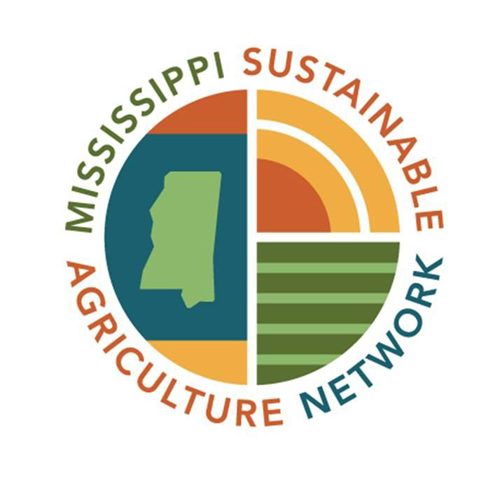
By: Shaundi Wall
A 2011 study on air quality, water quality, recycling rate, number of LEED buildings, number of green businesses, per capita water consumption, per capita energy consumption, per capita emissions, renewable energy generation, and how progressive its state legislature has been in adopting green measures ranked Mississippi as 41st in the nation in a state ranking of sustainability. Adding accessibility to healthy and local food moves Mississippi even further down that list.
Today, there are many individuals and organizations in the State trying to improve these numbers, and Daniel Doyle, statewide coordinator for the Mississippi Sustainable Agriculture Network (MSAN), is one of them. The primary organization in the state of Mississippi concerned with sustainable farming and local food systems, MSAN is a network of farmers, consumers, educators, and activists all working together to improve the sustainability of our existing agricultural system here in Mississippi.
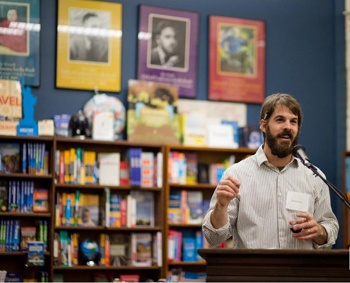
The idea of a statewide network connecting farmers and good food advocates in Mississippi has been talked about for several years now.
In 2012, Doyle “had an opportunity to actually get the network off the ground, and we started our first programs in early 2013. We are still working towards the organizational development, with a steering committee of over 30 people – farmers and organizational representatives from all over Mississippi – helping us to establish ourselves. That being said, we’ve got a lot of good energy and momentum built from this year’s programs, and I’m confident we’ll get the support and commitments we need to move forward.”
MSAN’s mission is to make sustainable farming and local food production thriving enterprises here in Mississippi. Mississippi is an abundantly agricultural state with great natural elements to support growing food; unfortunately, only a very small minority of its agricultural land goes towards producing food with the vast majority of it dedicated to commodity crops of corn, soybean, cotton, and pine. An even smaller minority of those farmers actually growing food that will be consumed by Mississippians are doing so using natural, sustainable practices. A way of farming that is truly sustainable must be ecologically centered, produce a profit for the farmer, and meet equitable social objectives as well.
MSAN defines sustainable agriculture as one that promotes 1) the health of farmers, consumers, and their communities 2) stewardship of the environment and non-renewable resources and 3) long-term financial viability. In essence, a model that is regenerative and not exploitative in nature – for the land, the crops, the soil, wildlife, and the people it supports.
“Every farmer who sets out to grow or raise products naturally and sell locally in the State has come up against similar obstacles, and that is largely due to the limited number of them who are currently doing so – but this number is growing every year and now most communities in Mississippi, no matter how rural, are looking to access fresh, healthy, and sustainably-grown food from local farmers. And every year, more and more farmers are rising to the challenge despite increasing land costs and discouraging regulations that make it difficult for small farmers to get started. MSAN is poised to facilitate, support, and promote this growing market,” says Doyle.
“MSAN is a way to encourage more support for locally-grown, responsibly-raised food, to foster a new generation of farmers dedicated to regenerative agriculture while supporting their growth, and to bridge the gap from where we are and where we need to be through educational outreach and building community awareness,” says Doyle.
To that end, MSAN partnered with Gaining Ground Sustainability Institute of Mississippi (GGSIM) in March, 2013, to present a Mississippi Food Summit in Oxford, Miss. as the kick-off for MSAN. The MS Food Summit was funded by the Appalachian Regional Commission through a University of Mississippi grant and organized by Doyle and Jody Holland, professor of Public Policy at Ole Miss. The informative and inspiring summit was attended by over 200 people, included several panels, and enjoyed keynote speakers such as UM’s Chancellor Dr. Dan Jones; Mary Berry, daughter of author and farmer Wendell Berry; and food activist and journalist Mark Winne.
Jim Ewing, author, Outreach Coordinator for the Gulf South Region of the National Center for Appropriate Technology (NCAT), and co-owner of Shoo Fly Farms in Lena, Miss., and said he was honored to give the keynote address What is Sustainable Agriculture — and Why! for MSAN’s speaker series on sustainable agriculture this past spring.
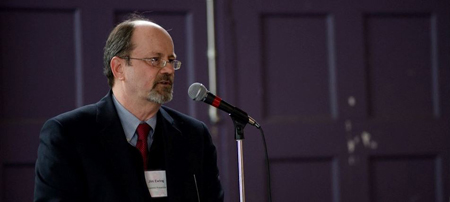
“To be involved in such an ambitious project as MSAN has undertaken is simply stunning. Any established sustainable agriculture organization would be hard-pressed to adequately address the variety and complexity of topics laid out in the speakers series, but MSAN has admirably stepped up to the plate with expert after expert giving cogent, well-developed presentations understandable to the average person, or farmer interested transitioning to sustainable growing. When coupled with actually walking the turn rows during MSAN’s Farm Tours, and plans to develop ongoing demonstration farms, MSAN is on a course of excellence that is a credit to the region and MSAN’s founders,” states Ewing.
In July and August, MSAN visited farms in North Mississippi and Alabama. The final September Farm Tour will be held in Mississippi’s Golden Triangle. The farms have opened their gates and allowed participants to fully interact with farmers, ask questions, and see exactly what daily, sustainable farming practices look like in Mississippi’s communities. The Farm Tours, true to the mission of educational outreach and community awareness, are open to the public and free of charge. Lunch is provided, and there is assistance available for transportation if needed.
The final Farm Tour of 2013, the Golden Triangle Tour on September 29th, will first take participants to Black Creek Farm in Columbus which produces naturally grown vegetables and eggs. Beaverdam Fresh Farms in Cedar Bluff which grows a diverse range of products from mixed vegetables to pasture raised chicken, eggs, pork, and rabbits – and partners with High Hope Farm and their grass-fed beef operation – will be the day’s second stop. The day will conclude at Bountiful Harvest Farm in Starkville which focuses on Certified Naturally Grown fruit, vegetables, flowers, and free-range eggs.
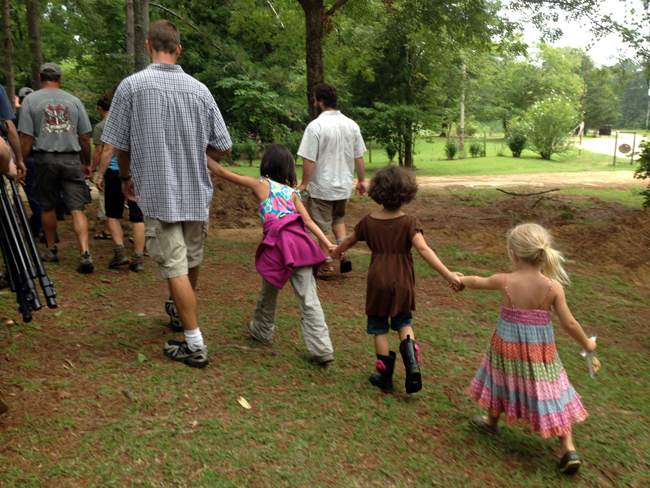
Those who aren’t afraid of getting their hands dirty and minds filled will not want to miss these incredibly informative and inspiring opportunities to visit some of Mississippi’s best sustainable farms. No registration for the Farm Tours is required. Please check MSAN’s website at www.mssagnet.net for times, locations, and more information.
In addition to the Farm Tours, MSAN is offering free training courses taught by professors and farmers currently running from July through September. These consists of 4-5, 20 minute presentations per session and can be watched live remotely at any local MSU Extension County Office on scheduled Monday evenings from 4-6 p.m. Interested persons will need to contact their local MSU Extension Office to reserve the video-conference room as sessions will be filmed live and streamed in from Starkville and Raymond.
According to Steve Depew, Soil Survey Project Leader in Tupelo for the USDA-NRCS, who presented in an earlier session, Finding and Acquiring Good Farm Land & Soil Testing, “The MSAN comprehensive training courses are exactly what is needed right now. The combination of speakers and topics is indeed comprehensive. From public agencies that have information and assistance to offer, all the way to those actually in sustainable operations, it covers the whole gamut.”
Courses comprise a variety of topics on all aspects of starting and running a sustainable farm, from finances to food quality, livestock to orchards, composting to rain water collection, weeds to bees, and nearly everything in between: health/nutrition, marketing/branding, growing practices, education, value added products, direct sales, financial management, record-keeping, business plan development, farm to school, agri-tourism, renewable energy initiatives (biodiesel tractors, solar powered irrigation, etc.), finding reliable labor and alternative models (profit sharing, equity building, work share), finding/acquiring farm land, soil and water conservation, rainwater harvesting, and healthy eating on a budget.
“Idea sharing is vital in this movement for holistic systems and locally grown foods. There is no doubt that the future will be, again, in small farm operations that are energy efficient, natural resource friendly, and supportive of local communities,” states Depew.
MSAN’s Comprehensive Training Courses and Farm Tours are great and invaluable opportunities to tap into the extensive knowledge base of sustainable agricultural practices and opportunities here in the State. The networks provided through organizations such as MSAN give people the tools and resources needed to make better, healthier, more informed choices that will continue to promote not only the people, but the State of Mississippi.
For Mississippians who are interested in learning more about sustainable agricultural practices but aren’t able to make it to the Farm Tours, MSAN has a farm that can travel to them. The Mississippi Mobile Farm is a school bus that that was recently donated to MSAN by GGSIM. The bus, which runs on biodiesel and solar power, has been converted into a working farm on wheels.
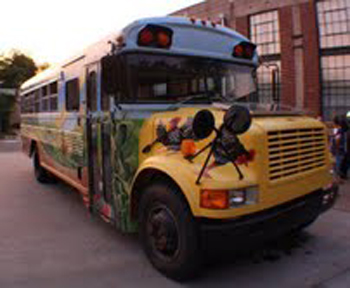
In 2011, it made a cross-country trip as an educational outreach tool for sustainability and showcases several sustainable agricultural methods: a compost bin, bee-hive, worm bin, and a rainwater catchment system used to irrigate the interior garden. It even contains a small chicken coop whose residents sleep on the bus and free-range during the day with a portable fence. The Mobile Farm has its own website (www.msmobilefarm.com) and Facebook page. “The farm that comes to you” is an invaluable opportunity offered through MSAN for schools and any other groups interested in using the MS Mobile Farm as a teaching tool with real-life, tangible experiences of the best examples of sustainability and farming today.
Sustainability, like farming, is a way of life. It isn’t just knowing that there is a better way; it’s actually doing things in a better way.
“We have some incredible farms and farmers from all over the state that need our support. Please make an effort to shop at your farmers markets, ask growers about their practices, purchase organic when possible, join a CSA (Community Supported Agriculture), cook and eat seasonally, and best of all – start a garden!” says Doyle. Together, we can forge a better and more sustainable Mississippi to benefit of the Mississippians of today and tomorrow.
For more information on MSAN’s Farm Tours and speaker series, including event dates, times, and locations, or to learn more about the Mississippi Food Summit, the Mississippi Mobile Farm, sustainable agriculture in Mississippi, and other MSAN programs, visit MSAN at www.mssagnet.net or email info.msan@gmail.com.
by Shaundi Wall
Outreach Coordinator
Mississippi Sustainable Agricultural Network
outreach.msan@gmail.com
601.201.3002
September 3, 2013
Study/Ranking: http://www.prweb.com/releases/2011/4/prweb5243554.htm


